
News (826)
BRAC receives 14th World Toilet Organization Hall of Fame Award
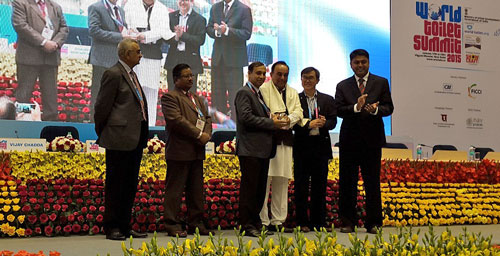
21 January 2015, Dhaka. World Toilet Organization (WTO) gave “Hall of Fame Award" to BRAC for significant contribution in Sanitation sector in Bangladesh. Director of BRAC WASH and DECC and TB programme, DrAkramul Islam received the awardat the 14th World Toilet Summit India in Delhi from Dr. Subramanian Swamy, MP & Former Minister of India and Jack Sim, Founder of WTO.
Minister Devendra Chaudhry, Special Secretary, Ministry of Power, India was also present in the occasion along with representatives from governments, donors, development partners, business sectors, NGOs and media.
Bangladesh has made remarkable progress in providing basic sanitation services to its people. It is now estimated that throughout Bangladesh, 57% use sanitary latrines. Open defecation has almost ended with only about 3% of the people not using toilets of any kind. The BRAC hygiene and sanitation programme reached more than 66 million people.
BRAC WASH and related programmes have made a substantial contribution to the nation's Millennium Development Goal (MDG) targets for water, sanitation and health and will continue to contribute to the Sustainable Development Goals (SDGs). Over 8 years, the BRAC hygiene and sanitation programme reached more than 66 million people, about half of the rural population of Bangladesh. It has successfully worked to improve household sanitation by creating demand for hygienic latrines [2] while supporting an extensive supply chain and local businesses. Current coverage with hygienic and adequately maintained toilets is 82% in the 152 districts where BRAC has worked. All these successes have been underpinned by a strong provision of service to the poor and ultra-poor and by a unique hygiene promotion programme focusing on universal use and sustainability of services in communities, households and schools.
BRAC distribute 20, 000 blankets in 13 districts of Bangladesh
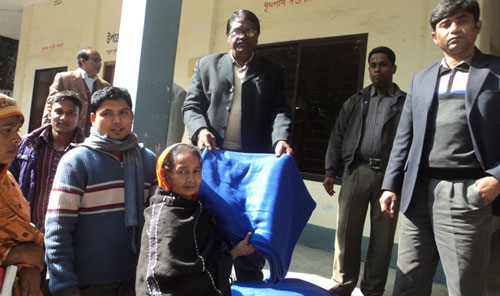
16 January 2014, Dhaka. BRAC distributed 20,000 blankets in the coldest districts of northern and southern Bangladesh.
The first cold wave of this year hit the people of northern and southern part of the country the hardest, causing many to suffer. BRAC promptly took the initiative to distribute blankets in 81 upazila under 13 districts. During 12-16 January 2014, 1,000 blankets in Panchagarth; 2,000 in Nilphamari; 1,500 in Thakurgaon; 2,000 in Dinajpur; 1,500 in Joypurhut; 1,000 in Pabna; 1,500 in gaibandha; 1,000 in Lalmonirhat; 2,000 in Kurigram; 2,000 in Rangpur 2,000 in Jessore; 1,500 in Satkhira and 1,000 in Jamalpur have been distributed.
The blankets were distributed by regional managers, regional accounts managers of BRAC, the district BRAC representatives from thirteen districts with support from local government officials. The initiative has been supported by BRAC’s core fund.
Open defecation in country has been reduced from 42% in 2003 to 3% in 2012
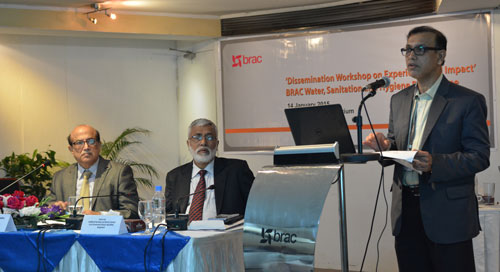
14 January 2015, Dhaka. BRAC’s Water, sanitation and Hygiene programme held a dissemination and impact sharing workshop on 14 January 2015 at BRAC Centre to share its experience and future strategy with the stakeholders.
BRAC started its WASH programme in 2006 to tackle contamination issues. The significant achievement of reducing open defecation from 42% to 3% (from 2003-2012) was the major finding of the research. The programme works through an intensive implementation strategy to reach rural population from all walks of life. Starting from individual household visits, cluster meetings, schools, mosque forums, formation of village WASH committees promoting rural sanitation centres and regular advocacy workshops are the key implementation strategies of the programme.
BRAC’s vice chairperson and interim executive director Dr Ahmed Mushtaque Raza Chowdhury chaired the workshop where director of BRAC’s WASH programme gave the keynote presentation on the future strategy for BRAC’s WASH programme. Ms Martine van Hoogstraten, deputy head of mission, head of economic affairs and development cooperation, Embassy of the kingdom of the Netherlands in Dhaka and additional secretary of ministry of LGRD ms Zuena Aziz were present as guests of honour.
BRAC Sierra Leone empowers child Ebola survivors and adolescent girls in collaboration with Ministry of Social Welfare Gender and Children’s Affairs
7 January 2015, Sierra Leone.
Interventions include cash transfers, radios and safe spaces for girls; efforts will help recovery efforts by providing livelihood assistance for affected families and support for adolescent girls
BRAC, in collaboration with the Ministry of Social Welfare Gender and Children Affair (MSWGCA), has started distributing cash grants to young Ebola survivors with the aim of starting small livelihood activities, while also supporting adolescent girls in Ebola recovery efforts.
Distributed in the districts of Port Loko, Kambia, Moyamba and Pujehun, the cash grants have been given to orphans below the age of 22, sexually abused children, and families with children affected by Ebola. The grant amounts consist of two disbursements of 200,000 leones ($47) each, paid one month apart. BRAC is targeting 1,050 beneficiaries within the four districts, with 96 having receiving payments as of January 7. The initiative is funded by UNICEF Sierra Leone.
Meanwhile, BRAC is also working to close the gaps created by schools closures in the wake of the Ebola crisis. Its Empowerment and Livelihood of Adolescents (ELA) project is providing 840 radio sets (four for each of 210 communities), along with textbooks, exercise books, pens and pencils to boost the learning capacity of non-school goers. This promotes the Ministry of Education’s Emergency Radio Teaching programme which has immensely helped adolescents and children stay focused. The BRAC intervention targets 24 chiefdoms in Port Loko, Kambia, Moyamba, and Pujehun.
With schools and most recreational centres closed amidst the economic crisis, girls have been limited in movement and confined to their homes. This creates a stressful situation in families and communities while exposing adolescent girls to abuse, violence, and exploitation. BRAC has synced its Ebola-related activities to existing efforts to end child marriage and teenage pregnancy, as these issues are all closely related.
Funded by UNICEF, BRAC’s Empowerment and Livelihood for Adolescents (ELA) programme provides safe spaces for adolescent girls, life-skills and livelihood training, microloans and community mobilization for reduction of teenage pregnancy and child marriage. It is a part of a network of girls’ clubs in five African countries with 77,000 members as of November 2014.
The existing ELA clubs’ spaces have also been used as social centres for the communities, supporting mentors to provide sexual and reproductive health training for adolescent boys and girls in smaller groups of five. The mentors, well-trained on key Ebola messages, in turn conduct door-to-door Ebola sensitization meetings and soap distribution near the clubs. Educational materials are also offered, turning the clubs into community libraries.
Owing to the fear of Ebola survivors being stigmatized, staffs and mentors have been trained on how to counsel and give support, such as psychosocial and psychological training, to people affected by the disease, helping them integrate back in their communities after treatment.
Ten years on, post-tsunami Sri Lanka charts a course for global crisis zones
26 December 2014, New York.
“From Aid to Enterprise,” a case study released by BRAC on the 10th anniversary of the Indian Ocean tsunami, suggests a path from grant-based aid to sustainable interventions and for-profit enterprise.
Mangalika and her husband, K.G. Sirisena, recall the wall of water that swept over their home in coastal Sri Lanka ten years ago. “Eight feet of water came into the house,” she says. “The only things left were the clothes we were wearing. We were lucky to escape with our lives.”
Dec. 26 marks the 10-year anniversary of the Indian Ocean earthquake and tsunami, one of the deadliest natural disasters in recorded history. An estimated 230,000 people in 14 countries lost their lives in the disaster and immediate aftermath.
To mark the anniversary and highlight the possibilities for renewal in areas hit by wars, epidemics and natural disasters, BRAC, the development organization based in Bangladesh, has released a case study on its experience in Sri Lanka, “From Aid to Enterprise: BRAC’s Evolution from Relief to Sustainable Financial Services in Sri Lanka.”
Mangalika and her husband, featured in the report, were running a home-based business servicing Singer-branded and other electronic appliances, employing 12 part-time employees and making a profit of roughly $750 a month. The tsunami laid waste to their business along with countless others.

Mangalika with her husband and three sons in front of the family's new repair center.
"Crises of historic magnitude can lead to equally historic gains if women have the tools they need to seize control of their lives and wellbeing." – Susan Davis
Mangalika rebuilt her business with microfinance loans from BRAC, using small loans to purchase spare parts such as motors, compressors and fans and power. “We were determined to re-build what we had, no matter what,” she says. “BRAC’s loans allowed us to do that.”
In “From Aid to Enterprise,” officials at BRAC discuss the challenges of transitioning an initially grant-funded nonprofit development organization into a sustainable microfinance institution, and in this case a for-profit microfinance provider eventually sold to the private sector in 2014.
“At BRAC, our objective is not to create a surplus for investors, or to perpetually use donor funds,” says S.N. Kairy, group CFO of BRAC and BRAC International. “It is to sustainably serve poor people. We prefer to start with subsidy and donor funds, and then gradually move to sustainability. That movement has to be driven by clients and their own ability to borrow greater amounts in their own time.”
A path forward
“From Aid to Enterprise” suggests a path for other countries in a post-conflict or post-disaster stage.
January marks the five-year anniversary of the earthquake that destroyed large parts of Haiti, for instance. BRAC entered Haiti shortly after the earthquake and now runs a center that provides artificial limbs and orthotic devices for those in need. Modeled on a similar BRAC center in Bangladesh, the BRAC Limb and Brace Center in Haiti is on a path toward full cost recovery.
The experience of BRAC in Sri Lanka also offers hope for recovery from the Ebola epidemic currently devastating parts of West Africa, according to Susan Davis, president and CEO of BRAC USA.
“Despite the situation we find ourselves in today with the rapidly unfolding crisis in West Africa due to the spread of the Ebola virus, it's worth looking at trends from recent decades to understand how philanthropic capital can build models of sustainability,” Davis wrote in The Huffington Post recently. “Crises of historic magnitude can lead to equally historic gains if women have the tools they need to seize control of their lives and wellbeing.”
BRAC operates microfinance, agriculture, girls’ empowerment and education programs in Sierra Leone and Liberia, and is part of the Ebola Survival Fund, a coalition of nongovernmental organizations determined to crush Ebola.
“From Aid to Enterprise” documents the rare trajectory of BRAC’s operations in Sri Lanka, evolving from philanthropically funded relief operations to a commercial financial services company serving the poor.
Livelihoods lost and regained
More than 35,000 people lost their lives in Sri Lanka during the Indian Ocean tsunami. More than 800,000 were displaced, and according to official estimates, more than 150,000 people lost their livelihoods. About 90% of those affected lost productive assets, including their dwellings.
BRAC’s initial post-tsunami relief interventions in Sri Lanka were geared towards recovery and rehabilitation efforts, including the cleaning and disinfesting of contaminated water wells, constructing latrines to prevent health hazards, and replacing lost and damaged school materials. Beginning in 2006, as the need for immediate disaster relief and rehabilitation efforts subsided, BRAC moved towards providing micro-loans and facilitating economic development at the community level.
BRAC took a phased approach to entering the sustainable microfinance sector. Within a year of operations, it had reached more than 26,000 clients, making it a significant microfinance provider in Sri Lanka. Starting in 2007, selected clients – mostly women heads of households, widows, and those without other assistance – began receiving training on poultry and livestock rearing, agriculture, and enterprise development. Women were trained in basic business planning, assessing the market, locating wholesale options, handling day-to-day bookkeeping, and interacting with customers. A capacity development program also helped strengthen other local organizations.
Regulatory hurdles for microfinance
A local microfinance expert quoted in “From Aid to Enterprise” credited BRAC’s robust growth with “well established management practices, systems, and a ready methodology largely replicated from Bangladesh.”
By 2007, the company had evolved to a fully-fledged microfinance operation, and a near replication of BRAC’s microcredit model in Bangladesh BRAC scaled its operations to a portfolio of over USD 11.2 million, serving 74,000 borrowers at its peak in 2011.
After 2011, BRAC loan portfolio began to contract as a result of capital constraints that resulting partly from Sri Lanka’s lack of regulatory framework. There were ambiguities and restrictions on how microfinance organizations could fund their operations. BRAC’s legal structure effectively prohibited it from borrowing funds on a commercial basis from international sources, and its ability to finance operations through savings deposits was constrained by government directives, resulting on a squeeze on access to capital.
In June 2013, BRAC partnered with Lanka Orix Leasing Group (LOLC), a longstanding provider of leasing and insurance and other financial products in Sri Lanka with its own existing microfinance practice (LOLC Micro Investment Ltd), to acquire a majority stake in a regulated financial services company, the for-profit Nanda Investment and Finance PLC (NIFL). In 2014, in response to new changes to the Sir Lankan central bank’s capitalization requirements, the board of BRAC International sold its 59.33% stake in the jointly held company, BRAC Lanka Finance PLC, to Commercial Leasing and Finance PLC, a subsidiary of its partner, LOLC.
The sale was completed in September 2014, marking BRAC’s exit from Sri Lanka and ending a successful transition from aid to enterprise.
“Sri Lanka is successful because we started with grant funding,” says Kairy. “This is the best way to set up, as it allows you to really reach the poor, and then allows a path for sustainability to emerge. If there is no grant, then in effect, you are serving a higher income portion of the population, perhaps the moderate poor. But to eventually get to a place of sustainability while serving the poorest, an organization needs some level of subsidy at the start.”
Download the full Sri Lanka case study, “From Aid to Enterprise,” here.
Australia, BRAC and the UK continues their work on ending violence against women and girls
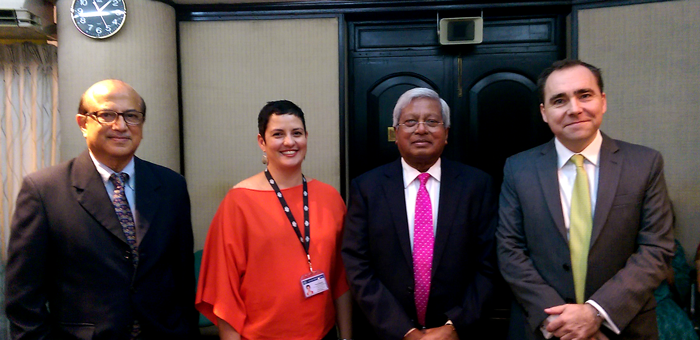
At BRAC’s Board Meeting on 3 December, Australia, BRAC and the UK reiterated their commitment to work on ending violence against women and girls in Bangladesh. This joint statement was released as part of the 16 Days of Activism against Gender Based Violence Campaign.
In issuing the statement, BRAC Chairperson Sir Fazle Abed said, “Empowering women and girls is the key to successful economic and social development. BRAC has always believed in collaborations- hence, once again, if we want to deliver real results, the government, private sector and civil societies need to work together to fight gender disparity. I am proud of the progress made in Bangladesh, but there is still work to be done.”
“Investing in girls and women has a transformative impact on growth and poverty reduction,” said Paul Whittingham, Deputy Country Representative for DFID Bangladesh. “That is why, as strategic partners, UK, BRAC and Australia support women and girls to live free from violence, and support their education, health and economic empowerment so they can achieve their full potential.”
“Our shared approach is to work with men and boys as well as women and girls to make sure that women are valued by society and from there to ensure their social and economic rights.” added Priya Powell, Counsellor (Development Cooperation) at the Australian High Commission.
With the support of Australia and the UK, BRAC’s advocacy and social and economic development programs empower women to be actively engaged in household decision making, reduce incidences of violence against women and build the confidence of students to protect and protest against sexual harassment.
The 16 Days of Activism against Gender Based Violence Campaign started on 25th November 2014 and this year the theme is “From Peace in the Home to Peace in the World: Let’s Challenge Militarism and End Gender-Based Violence". This theme is well aligned to the gender strategies of all three partners. As a part of this campaign, BRAC has organised discussion forums, rallies, poster displays and other awareness creation activities across Bangladesh. BRAC is also participating in events organised by the Government of Bangladesh and other organisations to mark this campaign.
Violence against women and girls affects a large majority of the female population, regardless of their socio-economic status. A national survey done by BBS shows that about 87% of currently married women have experienced some type of violence in their lifetime; (65% have experienced physical violence, 80% have experienced psychological violence, more than one third have experienced sexual violence, in each case, perpetrated by their intimate partners or current husbands). About one third of women have paid dowry for the current marriage. Bangladesh has the highest rate (65% of child marriage) in South Asia. A very recent survey done by ActionAid reveals that 85% of urban women and girls face some form of sexual harassment the in public domain.
Strong legislation is in place but effective implementation remains a challenge. There are other challenges around provision of support services, capacity of law enforcement agencies and having access to justice. Australia, BRAC and the UK are focused on continuing their work together to address these issues through effective programs and also developing new programs that address emerging social problems related to gender based violence.
BRAC Uganda awarded at the 2014 Financial Reporting (FiRe) Awards
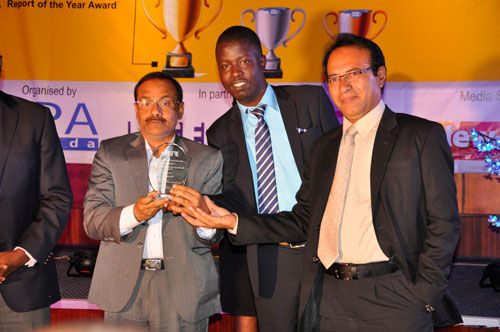
16 November 2014, Dhaka. On 6 November 2014, BRAC Uganda was recognised for its financial reporting system when it became the first runner up in the NGO category at the 2014 Financial Reporting (FiRe) Awards-Uganda, at the Kampala Serena Hotel.
BRAC Uganda has participated in the FiRe awards for the past three years, and has been recognised as the best NGO in both 2011 and 2012 and became the first runner-up in the same category in 2013.
This year, BRAC Uganda competed against 16 NGOs’ and 75 various sectors such as banking services, consumer and industrial products, education institutions, insurance services, the public sector and regulatory bodies and associations.
BRAC Uganda country representative Md Abul Kashem Mozumder, programme manager for microfinance Md Rafiqul Islam and country head of accounts Daniel Businge represented BRAC at the event and received the trophy and certificate.
The guest of honour at the event was the Speaker of the Uganda Parliament Rebecca Kadaga, and she was accompanied by the Minister of Finance, Planning and Economic Development Maria Kiwanuka. The FiRe Awards was inaugurated in 2011 with the aim to promote a standard financial reporting system in compliance with the International Accounting Standards Board (IASB). The awards are organised by the Council of the Insititue of Certified Public Accountants of Uganda (ICPAU).
Bangladesh Girl Summit 2014 Pledges concerted effort to end child marriage
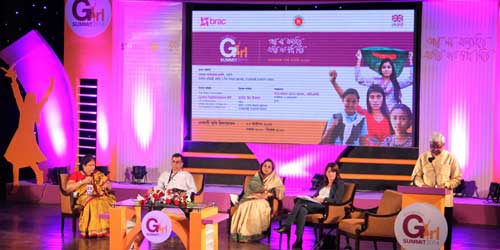
Despite Bangladesh has made significant progress in major human development indicators, including education, healthcare and child and maternal death, it has yet to go far to achieve a satisfactory result in reducing child marriage. Bangladesh has the highest child marriage rate in south Asia while fourth highest in the world. To end child marriage the government, civil society, media and social and political leadership must join hand and take up strong and well-coordinated effort.
Experts said these at the 'Bangladesh Girl Summit 2014' today (Monday October 27) held at the Osmani Memorial Auditorium in the capital. The summit was held with an aim to raise an effective movement for the empowerment and development of girl children through preventing child marriage. BRAC took the initiative for this summit for the first time with support from Ministry of Women and Children Affairs and the Department for International Development (DFID). The event was organised by the National Committee for Bangladesh Girl Summit 2014, a committee which was formed by 23 organisations including BRAC.
Meher Afroze Chumki MP, State Minister of the Ministry of Women and Children Affairs, Government of the People’s Republic of Bangladesh, attended the event as the chief guest. Lynne Featherstone MP, UK minister for international development, and Tariq-ul-Islam, secretary, Ministry of Women and Children Affairs, were present as special guests. Sir Fazle Hassan Abed, KCMG Founder and Chairperson of BRAC, chaired the event.
The daylong event started with the theme song of the event performed by a group led by famous singer Kona. Later interactive, live sessions were held participated in by stakeholders who declared solidarity and pledge against child marriage. An innovative 'Youth Voice' session was also arranged to bring forth the voices of the youth. Sheepa Hafiza, Director, Gender, Justice & Diversity and Migration Programme, gave the welcome speech. Noted writer and Chairperson of Bangladesh Shishu Academy, Selina Hossain, and Campaign For Popular Education Chairperson Rasheda K Choudhury also attended the event.
State Minister Meher Afroze Chumki said, 'Seventy per cent of women who are victims of torture in Bangladesh are from an age range of 13-18 years. Child marriage seriously affects work skill, which eventually affects the overall human rights situation. It is the reason Bangladesh government has taken up ending child marriage as its number one challenge'.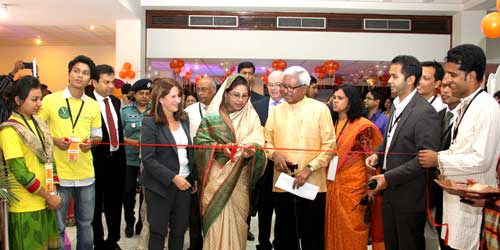
Ms Lynne Featherstone praised Bangladesh for its commitment pronounced at the July Girl Summit in London to end child marriage. 'Every girl has a right to childhood, and to a life free from violence and poverty. We must all play our part to alter girls’ social expectations, see them as valuable members of society, sources for hope for the future, and investments worth making,' she said.
Sir Fazle Hasan Abed, Chiarperson, BRAC said, 'The practice of child marriage has many deleterious effects on the societies where it occurs. Most obviously, it hurts the girl child herself by curtailing her opportunities for education and compromising her health and safety, thereby limiting her chances of achieving her full potential. There is also a profound impact on the next generation. South Asia is home to the highest number of malnourished children in the world. Girls who marry and bear children in their teens are unable to support the optimal growth and development of their offspring during pregnancy and the early years, resulting in significant numbers of low birth-weight babies and malnourished children'.
Bangladesh Girl Summit has been inspired by the UK Girls Summit held in London on July 22 this year and attended by the honourable Prime Minister of Bangladesh, Sheikh Hasina, and other world leaders. The event is an outcome of a continued effort to bring together diverse groups and actors to build a collective commitment against child marriage, paving the way for initiatives that would bring an end to this vicious practice once and for all.
Sir Fazle Hasan Abed receives Spanish Order of Civil Merit
24 October 2014, Dhaka. BRAC founder and Chairperson Sir Fazle Hasan Abed, KCMG has been awarded the prestigious Spanish Order of Civil Merit on 23 October 2014 for his efforts in tackling poverty and empowering the poor. Sir Fazle received the award from his Excellency Luis Tejada Chacon, Ambassador to Spain, on behalf of His Majesty King Felipe VI and the Spanish Ministry of Foreign Affairs at Hotel Lakeshore in Dhaka.
Known as the Orden del Mértito Civil in Spanish, this exalted medal of honour is granted to Spanish nationals or foreigners whose contribution to social development work has had extraordinary value. The announcement was made on October 12 2014, which is also Spain’s National Day.
Sir Fazle has received numerous other honorary degrees including Doctor of Humane Letters from Yale University (2007); Doctor of Laws from Columbia University (2008); Doctor of Letters from the University of Oxford; In 2009, he was appointed Knight Commander of the Most Distinguished Order of St. Michael and St. George (KCMG) by the British crown in recognition of his services to reducing poverty in Bangladesh and internationally.
Press conference on 8th International Conference of Asian Society of Agricultural Economists’
.jpg)
14 October 2014, Dhaka. It is a stylized fact that with rapid rural to urban migration of the population in the process of economic development the farm size gradually expands that facilitates adoption of labor saving technologies and growth of agricultural productivity and marketed surplus for the growing urban population. The history of agricultural development demonstrates that almost all of the present day developed countries in North America and Europe followed that process. The Asian agricultural development experience, however, seems to be an exception of that stylized fact. In Japan, South Korea and Taiwan that already went through the process of economic transformation; the farm size has hardly increased despite removing restrictions on the ceiling of landownership that was imposed after the World War II. Indeed, with on-going economic progress the farm size tends to get smaller in most countries in South and Southeast Asia, with the exception of Thailand, Pakistan and Northwestern India.
Could an upward trend in real wages that will accompany rapid growth and structural reforms in developing/emerging Asia reverse the trend? Or is the Asian Agriculture going to be dominated by small and marginal farmers? Would it constrain the growth in agricultural investment, adoption of improved technologies, and agricultural productivity? What kind of public policy should be adopted to address the inherent constraints of small farms? The 2014 Conference of the Asian Society of Agricultural Economists will try to address the above issues. In quest to answer such burning questions, in the upcoming 8th International Conference of Asian Society of Agricultural Economists’, three pre-conference workshops/symposiums will be organized on 14th October and more than 150 research papers in the following sub-themes will be presented from 15th to 17th October:
Sub-theme I: Transformation of Agrarian Structure in Asia
Sub-theme II: Farm Size and Productivity Revisited
Sub-theme III: Institutional Innovations and Development of Markets for Agricultural Services
Sub-theme IV: Agricultural Value Chain: Linking Small Farmers to Markets
Section V: Migration, Gender and Farming Systems
Sub-theme VI: Rural Non-farm Economy: Multi-Occupation Strategy for Sustaining Livelihoods
Sub-theme VII: Lessons from Agricultural Policy Adopted by Japan and South Korea
Sub-theme VIII: Public Policy for Supporting Small Farms
Begum Matia Chowdhury, Honorable Agriculture Minister, People’s Republic of Bangladesh will be present as the Chief Guest of this international conference. President elect of ASAE and advisor to the Executive Director of BRAC, Dr. Mahabub Hossain will deliver his welcome speech. Presidential speech will be delivered by the Outgoing President of ASAE and the Philippine Socioeconomic Planning Secretary Dr. Arsenio Balisacan. Professor Dr. Joachim von Braun, Director of Center for Development Research (ZEF), University of Bonn will deliver the Keynote speech on “Small firms: large numbers, great diversity, big role”. It is expected that more than 250 representatives including policymakers, donor agencies, academicians, researchers and practitioners will participate in this conference.
Relevance of 8th ASAE International Conference for Bangladesh
Due to the structural change in economy, Bangladesh has recently experienced a decreasing contribution of agricultural sector to its Gross Domestic Product (GDP). From the perspective of economic transformation; urbanization, migration and rural/agricultural sector are closely interlinked with each other. A substantive portion of the rural population is migrating internationally or internally in search of better paying jobs and several other reasons. Despite massive increase in land price, diversity is observed in land ownership and share cropping system instead of land selling. The number of small, medium, marginal and landless farmers is increasing compared to the large ones leading to an increase in the numbers of farms and a decrease in sizes. In the 1970s, like all other Asian countries, it became evident in Bangladesh that small farms are more productive than the large ones. On the contrary, according to the notion of economies of scale, this phenomenon will not bring in any positive impact in our agriculture. Small and marginal farmers, failing to meet their basic necessities by means of agriculture, are forced to rely on non-agricultural activities. This gives rise to agricultural diversity and multi-occupation. With the introduction of sophisticated technology at the very grass-root level, activities like- irrigation, sowing, harvesting, threshing and processing are getting highly institutionalized. Increasing trend in population growth is causing a sharp decrease in cultivable land, inequality of land-ownership, misuse of natural resources; climatic change, environmental degradation etc. We need to utilize information and communication technology for knowledge dissemination regarding the use of sophisticated technology, provide agricultural credit facility, relax the terms of trade in favor of agriculture and invest in the infrastructural sector. With a vision to turn Bangladesh into a middle income country and to resolve the problems in the agricultural sector in the 21st millennium, we need to adopt an agriculture friendly public policy to increase production and to ensure food security. Under these circumstances, ASAE international conference is an epoch making initiative for Bangladesh.
Join the world’s biggest family




